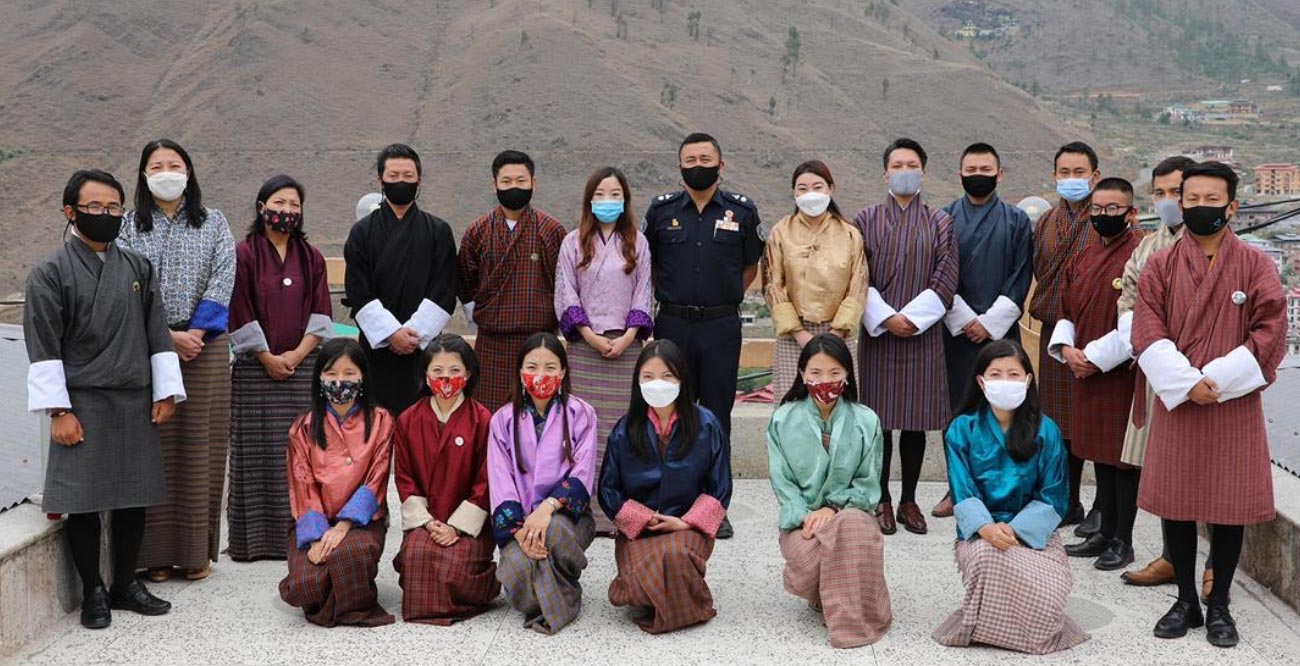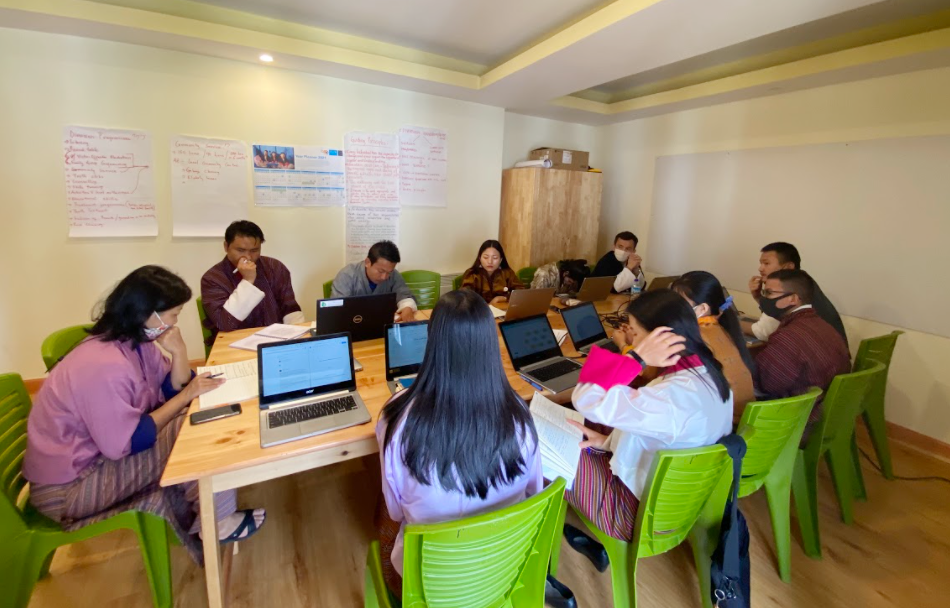The Human Dignity Clinic will allow students to understand, respectfully interact with, and advocate on behalf of Bhutan’s most vulnerable populations. The students will learn to use the law and acquired skills to improve the lives of their clients, understand professional ethics of client-centered-lawyering and advocacy, and remember to be self-reflective about their role as agents of change in their clients’ lives. The HDC uses various interactive teaching methods, simulations, and real-world experiential practice, all under the supervision of faculty supervisors working in constructive collaboration with the students.
Human Dignity Clinic in Action

Thangkha Conservation Project
In early 2018, BARRC, for “Bhutan Art Restitution & Reclamation Committee”, a unit under Bhutan Art and Culture Conservation Centre (BACCC) approached the Clinic to propose a long-term collaboration focused on the return of stolen and lost cultural artefacts to Bhutan. The preservation of Bhutan’s rich cultural heritage constitutes part of Bhutan’s determination to ensure respect for human dignity across Bhutan.
The specific case that prompted BARRC to contact JSW Law involved an effort to retrieve two Thangkas (a silk applique and embroidered Thangka of Ushnihvijaya, and a large Thangka of Avalokiteshvara Shadakshari) that were stolen from Phajoding Monastery. Thangkas are Buddhist scroll paintings on cloth. In 1972, 40 sacred and priceless Thangkas considered to be a part of Bhutan’s national heritage was stolen from the main Altar of the monastery. The Royal Government of Bhutan has been trying to retrieve these Thangkas ever since.
In 2017, two of those 40 stolen Thangkas were identified at an auction house in Hong Kong. Upon a request by BARRC to halt their sale, the auction house requested formal documentation proving that the Thangkas were, in fact, stolen artefacts from Bhutan. After submission of the requested documents, the two Thangkas were indeed removed from the auction. The Human Dignity Clinic (HDC) is currently working with the BARRC to analyze the strengths and weaknesses associated with various potential strategies for securing the return of these two Thangkas, which constitute an important part of Bhutan’s cultural heritage. The details of those efforts are confidential and ongoing.
Children in Conflict with the Law
Diversion Handbook of Children in Conflict with Law
The HDC developed a Diversion Program Handbook for Children in Conflict with Law (CICL). The handbook will guide Nazhoen Lamtoen in carrying out diversion programs for any CICLs who are for diversion. HDC drafted the handbook after various stakeholder consultations with the Royal Bhutan Police, the Office of the Attorney General, and the National Commission for Women and Children.
Community Service Mapping for Nazhoen Lamtoen (Thimphu and Paro)
The HDC explored and identified potential service providers for various community services that may be ordered during the diversion. Out of 5 piloted districts of Nazhoen Lamtoen, the team has covered Thimphu and Paro, wherein meetings with relevant and interested service providers were conducted. The service providers include Youth Development Fund, Department of Youth and Sports, Kidney Foundation, Greener Way, Youth Center, BarnYard Bhutan Animal Rescue & Sanctuary, and Jurwa, among many others.
Vulnerable Women
Legal Aid Guideline for Vulnerable Women
As a part of the technical team formed by the Office of the Attorney General in consultation with UNDP, the Human Dignity Clinic drafted the Legal Aid Guideline for Vulnerable Women in Bhutan. The objective of the guideline is to provide clarity on providing Legal Aid to vulnerable women. The first-ever document gives clear guidance to providing immediate and effective Legal Advice, Legal Assistance, and Legal Representation to Vulnerable women. The technical team consists of representatives from the Office of Attorney General, National Commission for Women and Children, RENEW (Respect, Educate, Nurture, Empower Women), UNDP, and the Human Dignity Clinic.
Development of Advocacy Material for Legal Aid Guideline for Vulnerable Women
The HDC assisted the technical group formed by the OAG in drafting the Legal Aid Guideline for Vulnerable Women and Children. Legal aid is essential for protecting vulnerable groups to ensure fundamental fairness and public trust in the legal system and processes. Towards these aspirations, the guideline would provide guidance and clarity on providing legal aid to vulnerable women and children in the best interest of the service receivers.


RENEW Consensus Building Initiative
JSW Law’s first clinical project was a joint effort involving the ADRC and the Human Dignity Clinic to develop a new way to resolve certain types of domestic violence cases with RENEW, a civil society organization. The two clinics rolled out a nationwide Consensus Building Initiative, three weeks of workshops, and training for the various stakeholders. The project’s outcome was the development of the consensus-building Initiative handbook (a comprehensive Facilitators Manual) for RENEW volunteers. The Clinic successfully handed off this project to RENEW in May of 2019 after training the first batch of RENEW volunteers on using the handbook.
Persons with Disabilities
Advocacy Toolkit on Legal Proceedings: Access to Justice for PWD
The HDC drafted an Advocacy Toolkit on Legal Proceedings: Access to Justice for Persons with Disabilities (PWD). The team held consultative meetings with relevant stakeholders like the Judiciary, Royal Bhutan Police, the Office of Attorney General, Gross National Happiness Commission, Civil Society Organizations, and UNDP to address legal barriers and familiarize them with the justice system. The advocacy toolkit will primarily guide and provide legal information to PWD(s) or any individual and agencies concerning them in accessing justice during legal proceedings.


Nazhoen Lamtoen’s mission is to bring a smooth transition for the children who come in contact with the law. However, Nashoen Lamtoen and the relevant agencies face many challenges in dealing with CICLs slated for diversion. We lacked the understanding and the means to effectively engage the CICLs in bringing long-term changes in their lives. We did not have a good policy or guideline to guide us in dealing with diversion cases. With support from the Human Dignity Clinic of Jigme Singye Wangchuck School of Law, we came up with the DIVERSION HANDBOOK FOR CHILDREN IN CONFLICT WITH LAW, which has made it convenient for all relevant agencies, including us, to deal with diversion cases. The guideline provides a clear pathway for every diversion case. Furthermore, the Clinics also brought together all the relevant stakeholders to discuss various issues related to child justice and provided their feedback and recommendations on these issues.
The HDC helped Nashoen Lamtoen, and we are confident it will help change the life of every child who comes to us. Thank you, HDC!
Testimonial from Nazhoen Lamtoen, ED